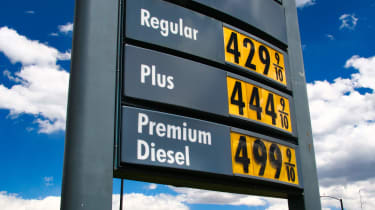We’ve all seen the rising cost of oil and its ripple effect through the economy, especially on prices at the pump. You may have also read that the U.S. is energy independent or that we export more oil than we import and that Russian oil only makes up 3% of all U.S. oil imports.
So why are oil and gas prices so high in the U.S.? The national average price for a gallon of regular gasoline was $4.24 as of March 30, up from $2.87 a year ago, according to AAA.
Prices Are Global, Not LocalA fundamental economic concept called the law of one price can help us understand what is going on. In short, this concept explains that even though the U.S. produces more oil than we use domestically, we buy and sell it on the global market. This means that buying pressures and supply shortages in other parts of the world impact the cost here, even if we produce oil here and use it here. In fact, there is money to be made if you can buy oil in the U.S. at a different price. You could buy in the U.S. then sell internationally and profit from the price difference.
It’s precisely this market force that causes oil — or any other commodity — to trade at one price worldwide. So, even being energy independent, we are still affected by the behavior of the (other) largest oil-producing nations (including Russia, Saudi Arabia, etc.).
Courtesy of Adam Grealish
Source: U.S. Energy Information Administration
What Does This Mean for Your Portfolio?Besides the pain at the pump, higher oil prices can erode buying power as input and transportation costs for goods and services rise. Protecting one’s portfolio from inflation can be an imperfect science. Gold, commodities, Treasury inflation-protected securities (TIPS) or even bitcoin all offer some level of peace of mind, but each has its quirks.
While not a direct hedge, investors may also want to consider allocating more dollars to companies involved in renewable energy. Over time, as fuel costs rise, one can expect a greater focus and demand for sustainable energy alternatives.
The implications for sustainable energy go beyond climate impact. Russia’s invasion of Ukraine has cast oil dependence in sharp relief, as oil revenue powers the Kremlin. Less demand for oil can mean less dependence on and funding to Russia, as well as other countries whose practices and policies may not align with investor values.
Natural resources may be randomly distributed around the world, but your investments don’t have to be.
This article was written by and presents the views of our contributing adviser, not the Kiplinger editorial staff. You can check adviser records with the SEC or with FINRA.
Adam GrealishHead of Investments, Altruist
Adam Grealish serves as Head of Investments at Altruist, a fintech company on a mission to make great independent financial advice more affordable and accessible. With a career rooted in financial innovation, Adam most recently led Betterment’s strategic asset allocation, fund selection, automated portfolio management, and tax strategies. In addition, he served as a vice president at Goldman Sachs, overseeing the structured corporate credit and macro credit trading strategies.
Adam Grealish serves as Head of Investments at Altruist, a fintech company on a mission to make great independent financial advice more affordable and accessible. With a career rooted in financial innovation, Adam most recently led Betterment’s strategic asset allocation, fund selection, automated portfolio management, and tax strategies. In addition, he served as a vice president at Goldman Sachs, overseeing the structured corporate credit and macro credit trading strategies.
